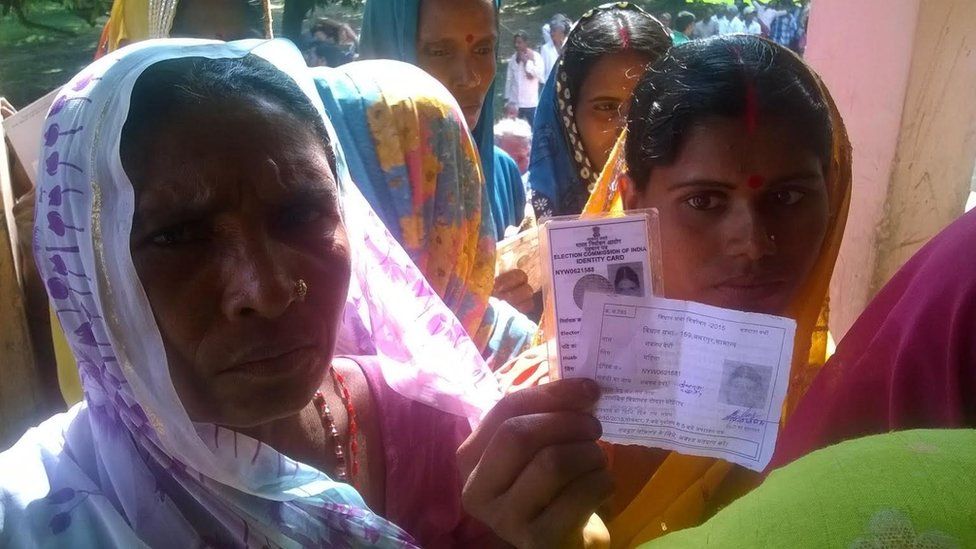Bihar election: Voting ends in first phase of Indian state polls
- Published

Voting has ended in the first phase of elections in India's Bihar state in what is being seen as a test of Prime Minister Narendra Modi's popularity.
Thousands of people queued at polling stations, with turnout put at 57%. The battle pitches Mr Modi's BJP against a "grand" coalition of local parties.
More than 66 million voters are eligible to cast ballots in five rounds of polling. Results are on 8 November.
Opinion polls predict a tight race. Bihar is one of India's poorest states.
Security was tight in nearly 13,000 polling stations in 49 constituencies on Monday. A total of 583 candidates were in the fray.
"Urging all those voting today in Bihar to vote in large numbers. I particularly urge my young friends to cast their vote," Mr Modi tweeted.
In the absence of a popular local BJP leader, Mr Modi has led the campaign for his party. Facing the BJP is a coalition led by two former Bihar chief ministers - Nitish Kumar and Laloo Prasad Yadav.
Bihar elections
- Total voters: 66.8 million
- Constituencies: 243
- Number of polling stations: 62,779
- Voting will be held in five phases from 12 October to 5 November
- Votes counted on 8 November
Source: Election Commission of India
'Grand alliance'
Correspondents say the prime minister is taking no chances in the state, and plans to hold some 20 public meetings in the next few weeks.
"A BJP government in Bihar will help us work seamlessly to create jobs for the youth, look after our farmers and ensure overall development, which is the antidote to every single problem," Mr Modi told a packed meeting last week.
A BJP win would further demoralise India's opposition, who are yet to recover from the debacle of last's year general election which saw a Modi landslide in the Hindi heartland.
It would also reinforce the belief that the Hindu nationalist party remains invincible despite its drubbing in state polls in Delhi in February, says the BBC's Soutik Biswas.
Also, a substantial win would help the BJP get more seats in the upper house of parliament in Delhi, where it lacks a majority, making it easier for the government to pass legislation for its economic reforms.
A win by the "grand alliance" - Janata Dal (United) and Rashtriya Janata Dal - would give the opposition a major shot in the arm.
Regional parties would be enthused to forge similar alliances to contest elections in states like Uttar Pradesh - which promises the mother of all battles - in 2017, our correspondent adds.
Although Mr Modi has campaigned on the promise of jobs and growth, a growing controversy over the issue of banning the slaughter of cows threatens to polarise voters on religious lines.
India's majority Hindus consider cows sacred and, since Mr Modi took over as prime minister, several BJP-ruled states have tightened laws protecting cows.
Emotions over the issue have been running high following the lynching of a 50-year-old man in Uttar Pradesh, allegedly over rumours that his family had been storing and consuming beef at home.
- Published9 September 2015